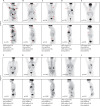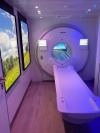PET/CT beats MR for assessing head and neck cancer treatment response
by Lauren Dubinsky, Senior Reporter | September 30, 2016
Molecular Imaging

Informing efficacy of chemo
after a single round of treatment
after a single round of treatment
Head and neck cancers are traditionally among the most challenging to treat and it’s important for clinicians to have ways to determine if the therapy is working early on. According to a new study published in The Journal of Nuclear Medicine, PET/CT is the best tool for doing just that.
Merging those two imaging technologies provides clinicians with a measurement of a tumor’s energy use and the conversion of glucose to energy. They can tell whether treatment is working after just one cycle of chemotherapy.
Researchers at The Institute of Cancer Research in London and The Royal Marsden NHS Foundation Trust included 20 patients in the trial. They assessed the patients with PET/CT and MR exams three months after completing a combination of chemotherapy and radiotherapy to determine how well they responded to treatment.

 They found that if the tumor’s energy use score fell by over 55 percent or the glucose score by more than 60 percent after the first round of chemotherapy, then the patient was likely to respond well to treatment. They also found that MR scans were less able to predict which patients responded well to treatment than PET/CT.
They found that if the tumor’s energy use score fell by over 55 percent or the glucose score by more than 60 percent after the first round of chemotherapy, then the patient was likely to respond well to treatment. They also found that MR scans were less able to predict which patients responded well to treatment than PET/CT.
Identifying whether patients are responding well to chemotherapy at an early stage gives the clinicians time to determine if the treatment should be reduced to avoid side effects. In addition, an unfavorable response may mean that radiotherapy or other treatments need to be increased.
“Our work suggests that high-tech PET/CT scans can spot patients whose treatment might not work very rapidly, after only one cycle of chemotherapy,” Kevin Harrington, the leader of the study, said in a statement. “That gives patients and clinicians either the confidence to persist with treatment, or early warning that it isn’t working so that it can be urgently switched for an alternative approach.”
Merging those two imaging technologies provides clinicians with a measurement of a tumor’s energy use and the conversion of glucose to energy. They can tell whether treatment is working after just one cycle of chemotherapy.
Researchers at The Institute of Cancer Research in London and The Royal Marsden NHS Foundation Trust included 20 patients in the trial. They assessed the patients with PET/CT and MR exams three months after completing a combination of chemotherapy and radiotherapy to determine how well they responded to treatment.
We repair MRI Coils, RF amplifiers, Gradient Amplifiers and Injectors.
MIT labs, experts in Multi-Vendor component level repair of: MRI Coils, RF amplifiers, Gradient Amplifiers Contrast Media Injectors. System repairs, sub-assembly repairs, component level repairs, refurbish/calibrate. info@mitlabsusa.com/+1 (305) 470-8013

Identifying whether patients are responding well to chemotherapy at an early stage gives the clinicians time to determine if the treatment should be reduced to avoid side effects. In addition, an unfavorable response may mean that radiotherapy or other treatments need to be increased.
“Our work suggests that high-tech PET/CT scans can spot patients whose treatment might not work very rapidly, after only one cycle of chemotherapy,” Kevin Harrington, the leader of the study, said in a statement. “That gives patients and clinicians either the confidence to persist with treatment, or early warning that it isn’t working so that it can be urgently switched for an alternative approach.”
You Must Be Logged In To Post A CommentRegisterRegistration is Free and Easy. Enjoy the benefits of The World's Leading New & Used Medical Equipment Marketplace. Register Now! |
|










